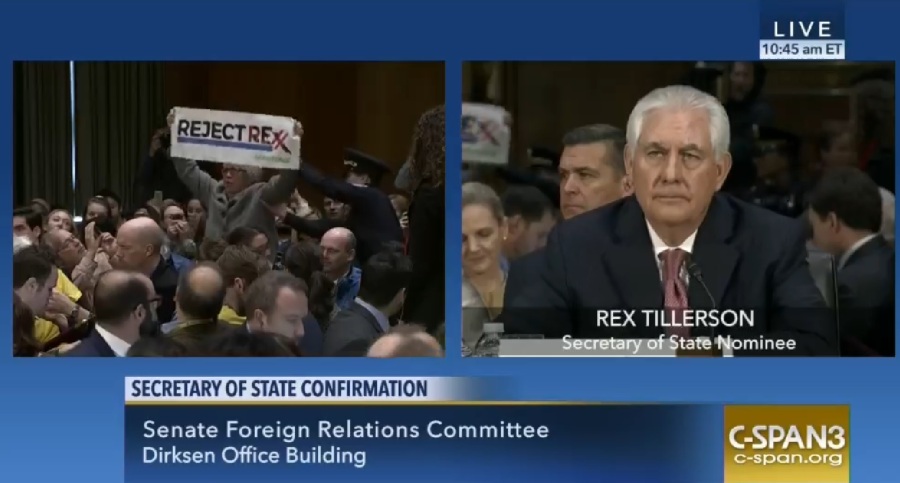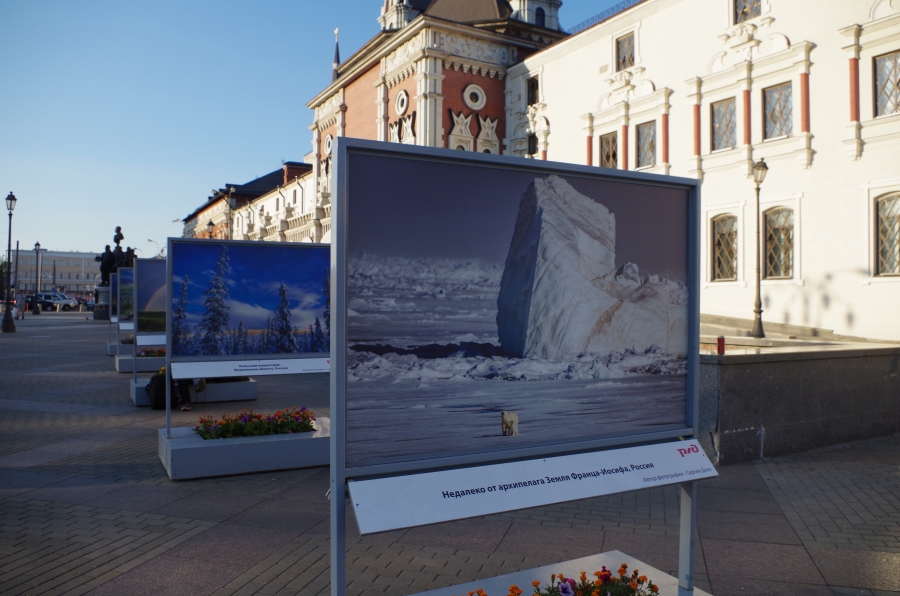
At today’s Senate confirmation hearing for President-elect Donald Trump’s nominee for Secretary of State, Rex Tillerson, expected topics like Russia, nuclear weapons, and Mexico came up. Climate change did, too, but the Arctic received short shrift. In searching the transcript of the lengthy proceedings, I found that the region was only mentioned twice: once by a protester and once by the oilman himself.
Yet even though it was little mentioned, the Arctic possesses a broader connection to the global issues that were discussed at the hearing, particularly the possibility of improved relations between the U.S. and Russia if Tillerson, a recipient of the Russian Order of Friendship is confirmed as Secretary of State. If the U.S. and Russia partner together in developing Russia’s offshore reserves, this could exacerbate global warming and the melting of the Arctic – a point that a protester made loudly clear above the calm and calculated voices of the senators in the room.
At one point, as Senator Ron Johnson (R-Wisconsin) was pressing Tillerson hard on Russia, a “RejectRexx” protestor interjected and unfurled a banner. The woman yelled, “Why is Tillerson friends with Putin? Because they both want to drill and burn the Arctic. That will ruin the climate and destroy the future for our children and grandchildren. Please don’t put Exxon in charge of the State Department. Protect our children and grandchildren – please don’t put Exxon in charge of the State Department.”
The protester was escorted out of the building, but her observation regarding the shared interests of Putin and ExxonMobil are correct. Both the Russian state and multinational corporation want to exploit the Russian Arctic’s supposedly vast reserves of oil and gas. Sanctions, however, have halted the pursuit of a joint project between ExxonMobil and Russian-state owned oil company Rosneft. This point, a rather sore one for ExxonMobil, came up later in the discussion when chairman of the Senate Foreign Relations Committee, Senator Bob Corker (R-Texas), asked whether ExxonMobil had lobbied against the sanctions.
Tillerson responded:
“I never lobbied against the sanctions. To my knowledge, ExxonMobil never lobbied against the sanctions. ExxonMobil participated in understanding how the sanctions were going to be constructed and was asked and provided information regarding how those might impact American business interests.
The only engagement I had really came after the sanctions were in place. ExxonMobil was in the middle of drilling a well in a very remote part of the Russian Arctic in the Kara Sea, several hundred miles way from any safe harbor. When the sanctions went into place because of the way they were written, they took immediate effect. There was no grace period, there was no grandfathering period. And I engaged immediately with the State Department and with Treasury and OFAC to explain to them that there was significant risk to people and the environment if – and we were going to comply with the sanctions, fully comply – but that compliance meant immediate evacuation of all these people, which was going to put lives at risk and the environment at risk because this was a wildcat exploration well that was at a very delicate position at the time. [We] provided a lot of technical information to OFAC and the State Department [and I was] thankful that it took about five days for them to understand that.
ExxonMobil stood still while they were evaluating that, and, in the end, did grab a temporary license to allow that work to be completed safely so that we could get all the people then out of the country and get all of the equipment that was subject to sanctions out of the country, including the rig. That was my direct engagement, really dealing with an effect of the sanctions. So the characterization that ExxonMobil lobbied against the sanctions is really not accurate.”
Playing Russian roulette with global climate
ExxonMobil may or may not have specifically lobbied against sanctions. But it’s clearly in the company’s long-term economic interest to drill in Russia and to drill in the Arctic, two activities which would inevitably add to global carbon emissions and exacerbate climate change. Thus, it’s pretty hard to imagine that Tillerson, as Secretary of State, would continue the Obama administration’s legacy of getting big climate agreements signed.
Senator Edward Markey (D-Mass) expressed, “The world expects us to be the leader on climate change. Please give us those assurances, that you will guarantee that the State Department will be the leader as it has been in advancing a climate agenda for our country.”
Tillerson gave no such assurances, as Emily Dreyfuss wrote in an article for Wired. He didn’t even confirm that he believes humans are causing climate change.
He was, however, more forthcoming regarding his hopes for a rehabilitation of relations between the U.S. and Russia. Tillerson felt that Russia is “predictable” in its activities, as they are “very calculating, very strategic in their thinking, and they have developed a plan,” he claimed. “There is scope to define a different relationship that can bring down the temperature around the conflicts we have today,” added the Texan native.
The irony is that if cooling the temperature of the U.S.-Russia relationship leads to a lifting of sanctions and a resumption of joint exploration of Arctic offshore oil, it could raise the planet’s thermostat. This potential chain of events adds another dimension to the Arctic paradox. Generally, this catchphrase describes the fact that as climate change melts the Arctic ice cap and jeopardizes northern ways of life, it opens up more opportunities for economic activities like oil drilling and shipping that will further destabilize the climate.
Now, a new twist to this paradox is that if relations between the U.S. and Russia are improved under a Trump administration with pro-oil Tillerson at the helm of the State Department, this could worsen the outlook for the global climate. A lot of positives could come out of improved relations between these two countries, but playing Russian roulette with the global climate by drilling in the Arctic isn’t one of them.

